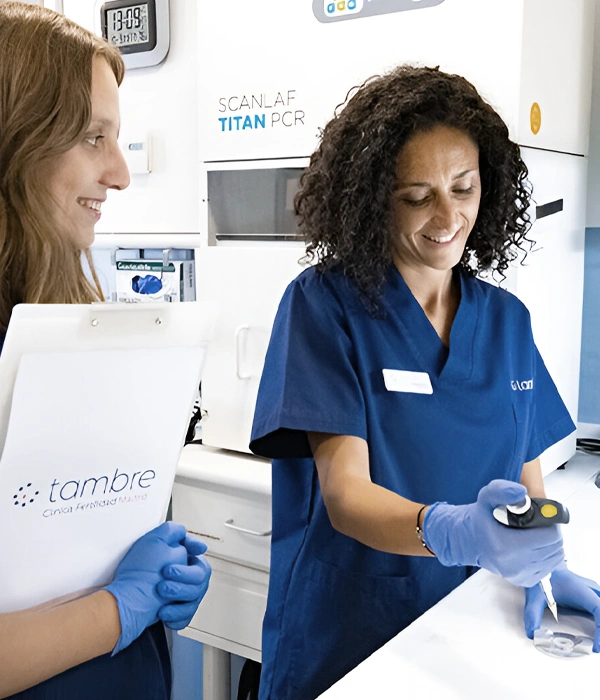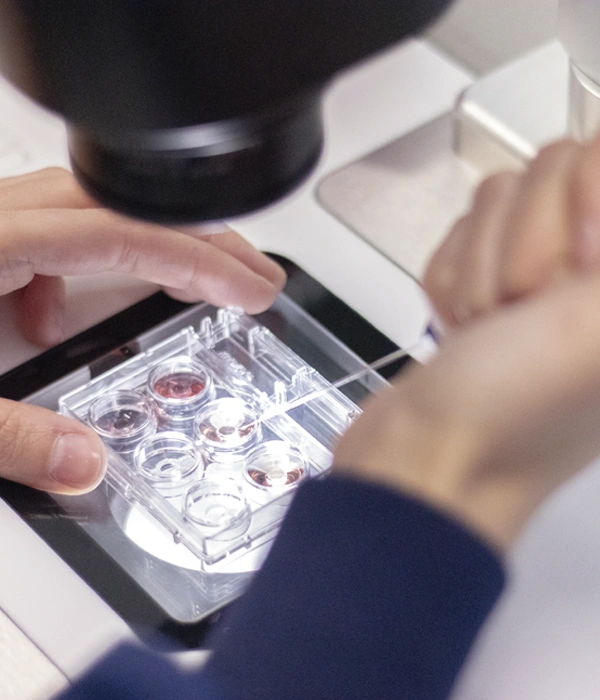First visit
We know how important our first meeting is for you. You have taken the first step, the most important one, and now we are going to accompany you in all the others. At Tambre we are different and we want you to notice it from the very first moment.


On the day of your first visit we will be waiting to show you what Tambre is like. The welcome team at the front desk will ask for your personal information and escort you to the individual waiting room. At the same time, we will open your electronic file to find your personal data.
Before your arrival, we may have asked you to send us some medical tests, which will help a lot in this first visit. Before you come in for your consultation, your patient care coordinator will come by to greet you, show you around the clinic and explain what Tambre is like.
She will accompany you to the office where your doctor and nurse will be waiting for you.

The visit with your fertility gynaecologist is a key moment. This first meeting takes place in an atmosphere of total trust, in a consultation where you will feel at ease. We know that you are taking a very important step and that it is not easy. That is why we want you to feel comfortable, you put aside your fears and understand that we share your goal. We will do everything possible to achieve your pregnancy and the birth of a healthy baby.
If you already have previous tests done, your specialist will analyse and evaluate them. In addition, you will undergo an anamnesis to learn about your medical and family history and background.

In this first visit our goal is to be able to offer you a diagnosis that will allow us to schedule your personalised treatment from the very first moment.
In the case of international patients, the visit will be conducted in their native language. In addition to Spanish, our medical team speaks English, French, German, Italian, Romanian, Arabic and other languages. In addition to these languages, we have international coordinators who are fluent in other languages, including Dutch.
Videoconference
If for any reason it is impossible for you to travel, you can make your first visit by video call, under the same conditions as if you were in the office.

In this first visit, if you wish, we will perform:
- A first complete gynaecological examinationand an ultrasound to assess the condition of the uterus, fallopian tubes, ovaries and detect any abnormalities.
- A blood test to check your anti-Müllerian hormone (AMH) status and to see your ovarian reserve.
- A spermiogram of your male partner, if any, and a study of sperm morphology to detect any abnormalities.

With all the information from this first visit, we will be able to offer you a diagnosis with which we will be able to provide you with a personalised treatment for your specific case.
And don’t worry if you have any doubts or need clarification after your first consultation, because your Personal Advisor will continue to be in touch with you to resolve any questions that may have arisen after this first visit with your specialist.
At the end of the consultation we will prepare a quote for your treatment in which we’ll include every detail.

As a Tambre patient, you have the opportunity to benefit from clinical studies that help us to improve our treatments and offer an increasingly accurate diagnosis. We are a clinic at the forefront of advanced reproductive medicine. Pioneers in the use of artificial intelligence (AI). And also in the use of the Geri Time-Lapse incubator. In addition, we are the only European clinic to carry out a clinical study to predict the receptivity of the endometrium in the days prior to embryo transfer and to avoid an unsuccessful implantation in many cases.
We let our success rates speak for us
Come for your first consultation and get your personalised diagnosis in one day
Shall we call you?


MATRIS clinical study
We are in the midst of developing a novel clinical study (Matris) that uses artificial intelligence (AI) to predict endometrial receptivity in the days prior to embryo transfer. In many cases, we can avoid an unsuccessful implantation.
The objective is to avoid losing a viable embryo because the receptivity of the endometrium is not correct.
